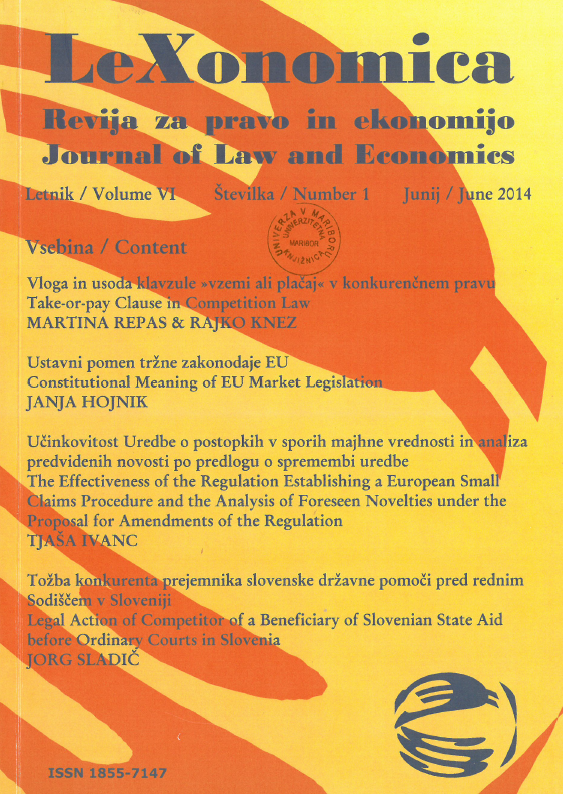Ustavni pomen tržne zakonodaje EU
Keywords:
EU internal market, centralisation, decentralisation, negative integration, positive integration, harmonisationAbstract
Constitutional meaning of EU market legislation. In the market field that is often perceived as the fundament of the European Integration Member States are hardly retaining competences to adopt economic-political decisions, thereby increasingly losing their role in the regulation of market issues. The author emphasises that the distinction between negative and positive integration and its mapping to de-centralist and centralistic approach to the internal market is of pure theoretical nature. As confirmed by the case law of the Court of Justice of the EU also, negative integration may lead to a considerable loss of Member States' autonomy. On the other hand, however, harmonisation as the protagonist of positive integration does not necessarily exclude Member States' competences in the market field. The author concludes that the EU internal market is increasingly regulated by the central authorities. This does not, however, mean simple reregulation – transfer of powers from the national to the Union level, but is rather a mixture of national and Union regulation. Modern regulatory techniques that tend to combine advantages of centralisation with preservation of local autonomy – minimum harmonisation, new approach, open method of coordination – present a mixture of centralist and de- centralist market regulation, thereby including a large number of actors, from the public and well as private sector.
Povzetek. Na tržnem področju, ki velja za temelj evropske integracije, države članice že zelo težko ohranjajo status subjekta, ki je pristojen sprejemati ekonomsko- politične odločitve, in tako vse bolj izgubljajo svojo vlogo pri urejanju tržnih vprašanj. Avtorica izpostavlja, da je razmejevanje med negativno in pozitivno integracijo ter njuna preslikava na decentralistični oz. centralistični pristop k notranjemu trgu zgolj načelne teoretične narave. Kot to potrjuje sodna praksa Sodišča EU, lahko namreč tudi na temelju negativne integracije države članice izgubijo obsežen obseg avtonomije. Po drugi strani pa harmonizacija kot protagonist pozitivne integracije nujno ne izključuje pristojnosti držav članic na področju trga. Avtorica ugotavlja, da je trg EU vse bolj intenzivno urejen s strani centralnih oblasti. Vendar pa pri tem ne gre za preprosto reregulacijo – prenos urejanja z nacionalne ravni na raven EU, ampak gre za zmes državnega in unijskega urejanja. Sodobne tehnike urejanja, katerih cilj je kombinirati prednosti centralizacije z ohranjanjem lokalne avtonomije – minimalna harmonizacija, nov pristop in odprta metoda usklajevanja – predstavljajo mešanico centraliziranega in decentraliziranega urejanja trga, pri čemer vključujejo široko skupino akterjev, tako iz javnega kot tudi zasebnega sektorja.
Downloads
References
Armstrong, K. A. (2000) Regulation, De-regulation, Re-regulation (London: Kogan Page).
Barnard, C. (2013) The substantive law of the EU: the four freedoms (Oxford: Oxford University Press).
Bernard, N. (2002) Flexibility in the European Single Market, v: Barnard C., Scott J. (ur.), The Law of the Single European Market, Unpacking the Premises (Oxford: Hart Publishing).
Bernard, N. (2002) Multilevel Governance in the European Union (Amsterdam: Kluwer Law International).
Burca, G. de (2003) The Constitutional Challenge of New Governance in the European Union, European Law Review, 28(6), str. 817.
Craig, P. (2002) The Evolution of the Single Market, v: Barnard, C., Scott, J. (ur.), The Law of the Single European Market, Unpacking the Premises (Oxford: Hart Publishing, Oxford).
Currall, H. (1984) Some Aspects of the Relation between Articles 30-36 and Article 100 of the EEC Treaty, with a Closer Look at Optional Harmonisation, Yearbook of European Law, str. 179.
Dashwood, A. (2004) The Relationship between the Member States and the European Union/European Community, Common Market Law Review, 41(2), 2004, str. 355.
Dougan, M. (2000) Minimum Harmonization and the Internal Market, Common Market Law Review, 37(4), str. 853.
Dougan, M. (2003) Vive La Différence? Exploring the Legal Framework for Reflexive Harmonisation Within the Single European Market, German Yearbook of European Law, 2003, str. 113.
Hooghe, L., Marks, G. (2001) Multi-Level Governance and European Integration, Washington: Rowman & Littlefield).
Knez, R. (2006) Delovanje notranjega trga s pomočjo harmonizacije, Zbornik Pravne fakultete Univerze v Mariboru, II(1), str. 257.
McGee, A., Weatherill, S. (1990) The Evolution of the Single Market – Harmonisation or Liberalisation?, Modern Law Review, 3(5), str. 581.
Oliver, P. (2003) Free Movement of Goods (London: Swett and Maxwell).
Pelkmans, J. (1987) The New Approach to Technical Harmonization and Standardization, Journal of Common Market Studies, 25(3), str. 38.
Poiares Maduro, M. (1998) We The Court, The European Court of Justice and the European Economic Constitution, A Critical Reading of Article 30 of the EC Treaty (Oxford: Hart Publishing).
Rogowski, R., Wilthagen, T. (1994) Reflexive Labour Law (Amsterdam: Kluwer Law Publishing).
Slot, P. J. (1996) Harmonisation, European Law Review, 21(5), str. 378.
Trubek, D. M., Trubek, L. G. (2005) Hard and Soft Law in the Construction of Social Europe: the Role of the Open Method of Co-ordination, European Law Journal, 11(3), str. 343.
Vignes, D. (1990) The Harmonization of National Legislation and the EEC, European Law Review,15(5), str. 358.
Woods, L. (2004) Free Movement of Goods and Services Within the European Community (Hampshire: Ashgate Publishing).
Downloads
Published
Issue
Section
License
© Univerza v Mariboru, Pravna fakulteta, Univerzitetna založba
Prosti pristop
